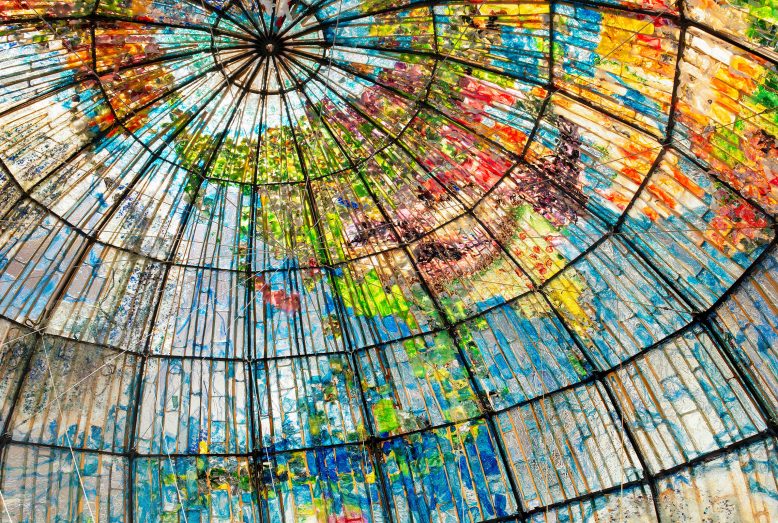Beverly Barkat. Earth Poetica
25 February 2022
 Beverly Barkat, Earth Poetica (detail). Ph. Michael Amar
Beverly Barkat, Earth Poetica (detail). Ph. Michael Amar
Project supported by Nomas Foundation
In collaboration with the United Nations Environment Programme (UNEP)
Opens on June 5, 2023 at 3WTC, lower Manhattan, New York City
Previous venue:
The Gottesman Family Israel Aquarium (March 6, 2022 - Januari 6, 2023)
Earth Poetica is an aesthetic questioning entangled between the artist’s inner horizon and the world, between material and meaning, one that American feminist theorist Karen Barad considers the true motive of agency. Letting collective imagery emerge in a determination to strengthen social accountability to further the ends of environmental justice, Barkat poetically explores geographical latitudes and longitudes with a transfigured image of the planet: vast oceans and seas, mountains, rivers and lakes, towns and cities, forests and grasslands, cultivated fields, industrial areas, deserts and steppes, all of it disappearing, suffocated by the plastic waste.
The artist classified, selected, manipulated, cut, broken up, softened, crushed, pulverized and polished fishing nets, bags, bottles, household articles, lids, labels and countless other kinds of plastic waste collected by different communities and individuals around the globe.
Translated into a taxonomy based on color, form, hardness, strength and transparency, plastic waste came to act as ready-mades that sublimate and put their own legitimacy and authenticity as garbage to the test in a new natureculture context.
The language of Earth Poetica echoes with both material as well as sociocultural challenges, raising questions about the engagement of the public sphere and a new prospect of posthuman citizenship. From the artist’s perspective, Earth Poetica surpasses any hierarchy and status: her aesthetic and poetic action proves that there are no boundaries between an individual and society, both being inextricably linked with politics, economy, culture, and science. This interconnection is the true key to understanding what direction we really want to take and what freedom we intend to exercise in order to reshape our deep relationship with nature and the commons, individually and collectively.
BIOGRAPHY
Beverly Barkat was born in Johannesburg in 1966. She moved to Israel with her family in 1976, where she graduated from the Bezalel Academy of Arts and Design in Jerusalem and completed her Master at the Jerusalem Studio School, under Israel Hershberg.
Barkat’s early works were largely figurative. Around 2009, she made a turn towards formal abstraction, and in 2014, her series of paintings inspired by Japanese calligraphy earned her the Curator’s Award at the 28th International Exhibition of Art & Design in Kyoto. Since then, she has continued to experiment with new techniques, application methods and materials in her art practice. Her reverse painted PVC sheets were exhibited during her first international solo exhibition, Evocative Surfaces (2017), staged at the Museum Palazzo Grimani on the occasion of the 57th Venice Biennale in 2017.
In 2018, Barkat’s second international solo exhibition, After the Tribes (2018), was held at the Museum Boncompagni in Rome. For her second site-responsive exhibition in Italy, the artist used an experimental medium of painting complemented by metal sculpture to explore the relationship between aesthetics and politics. The critically acclaimed After the Tribes (2018) was invited a year later, in 2019, to Taiwan, and was exhibited there at the Art Taipei art fair, engaging the wider Asian public. The artist held her first solo exhibition in Asia, in Taichung, Taiwan, in Summer 2022.
Barkat’s work has been placed in various private and public collections worldwide. Three of her artworks from the Evocative Surfaces series form part of the permanent collection of the Museo di Palazzo Grimani in Venice.